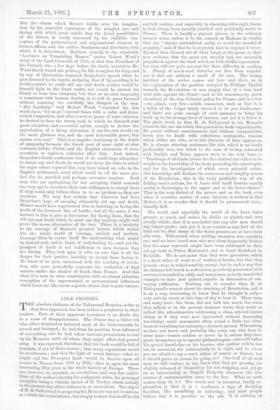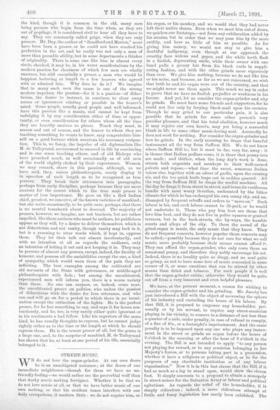ABLE PROSERS.
THE absolute dullness of the Talleyrand Memoirs, so far as they have appeared, has been rather a perplexity to their readers. Part of their apparent heaviness is no doubt due to a sense of disappointment. The Prince was a bitter wit who either despised or detested most of the Governments he served and betrayed ; he had from his position been informed of everything, and he had taken unusual precautions to seal up his Memoirs until all whom they might affect had passed away. It was expected, therefore, that his book would be full of scandals, if not of State secrets ; that many reputations would be overthrown ; and that the light of secret history—what we might call the Procopian light—would be thrown upon all events in France from 1789 to 1830,—that is, upon the most interesting fifty years in the whole history of Europe. There are, however, no scandals, no revelations, and very few exhibi- tions of the author's faculty for malignant satire, the principal exception being a vitriolic sketch of M. Necker, whom nobody in the present day either believes in or cares about. The object of M. de Talleyrand in preparing his Memoirs was not to satirise or belittle his acquaintance, but simply to show that in all he did and left undone, and especially in changing sides eight times, he had always been morally justified and politically useful to France. There is hardly a piquant phrase, in the ordinary memoir sense, unless it be his remark on Madame de Geniis, that she "always surrendered easily, to avoid the scandal of coquetry," and of that he is so proud, that be repeats it twice. Readers thus cheated out of their laugh at the great, or their new evidence that the great are . usually bad, are naturally prejudiced against the book which so little fulfils expectation but that will not quite account for their difficulty in reading it. Plenty of much-read histories are free from scandal, nor is this one without a merit of its own. The strong intellect of the writer comes out here and there, as in his explanation of the position occupied by Philippe Egalit6 towards the Revolution—it was simply that of a man mad with spite against the Court—and in his summing-up, given elsewhere, of the true Colonial policy for France, and in a few —we admit, very few—subtle comments, such as that it is a foible of the vulgar lately elevated to do you kindnesses ; and there are quite enough of such passages to bring his work up to the average level of interest, and yet it is below it. The plain truth is, that M. de Talleyrand in his Memoirs commits the one sin which this generation finds unpardonable. He proses without consciousness and without compunction, bores you to death with reflections, arguments, reasons which either are trite, or at this distance of time appear so. He is always uttering sentences like this, which is no doubt profoundly true, but which to the men of to-day, saturated with Carlyle and Taine, appears worn to the very bone :— " Teachings of all kinds [about the Revolution] are rather to be sought in the knowledge of the facts preceding the catastrophe, and for the investigation of which every material exists; this knowledge will disclose the numerous and weighty causes of the Revolution ; this is the truly profitable way of un- folding men's actions, for it bears with itself lessons equally useful to Sovereigns, to the upper and to the lower classes." That is the very dialect of the proser, and as the book, even when it contains matter of some interest, is written in that dialect, it is no wonder that it should be pronounced excer- tionally dull.
The world, and especially the world of the hour, hates prosers so much, and makes its dislike so plainly and even cruelly visible, that it is wonderful that any able men should any longer prose; and yet it is as certain as any fact of the kind can be, that many of the worst prosers are or have been able men. Talleyrand, when writing memoirs, was certainly ono, and we have heard men who met them frequently declare that the same reproach might have been addressed in their old age both to Prince Metternich and to Lord Stratford de Redcliffe. We do not mean that they were garrulous, which is a fault either of weak or of weakened brains, but that they prosed,—that is, talked sensibly enough, but in such a way that the listener felt bored to suffocation, positively persecuted with sentences intended to edify, and sometimes, as in the wonderful • example we have just quoted, capable in themselves of c'on- veying edification. Nothing can be sounder than M. de Talkyrand's remark about the teaching of Revolution, and it is, in a way, interesting to know that he thought it, only— only nobody wants at this time of day to hear it. These men, and many more like them, did not talk too much, but when they talked, or in the present instance wrote, they wrote or talked like schoolmasters addressing a class, uttered known things as if they weie new, instructed without increasing knowledge, made arguments often sound a little too clear, treated everything too solemnly,—in short, prosed. Who among us does not know, and probably like, some one who does it, some man—women seldom or never do it, unless they have given themselves up to special philanthropies—who win inflict his special knowledge on his hearers, who neither will be or can be answered, for substantially he is right, and to whom you are afraid to say a word either of assent or dissent, lest it should prove an excuse for going on? One-half of all such men, we will venture to say, know that they are prosing, are slightly ashamed of themselves for not stopping, and yet go on as interminably as Dugald Dalgetty whenever the true science of castrametation came to the fore. What on earth makes them do it F The usual, and in intention kindly ex- planation, is that it is a weakness, a sign of decaying faculties, like mumbling or tottering ; and most people believe that it is peculiar to the old. It is nothing of the kind, though it is common in the old, many men being prosers who begin from the time when, as they are out of pupilage, it is considered civil to hear all they have to say. They are constantly called prigs, when they are only prosers. Mr. Day, the author of "Sandford and Merton," must have been born a proser, or he could not have reached his perfection in the art, and he really was not only a man of more than passable ability, but in some departments a thinker of originality. There is some one like him in almost every circle, checked, it may be, in his worst manifestations by the modern passion for shortness of which few men are wholly unaware, but still essentially a proser, a man who would be happiest lecturing at length to a few hearers who agreed with or admired him. Why does he do it ? We imagine that in many such men the cause is one of the strong modern impulses, the passion—for it is a passion—of didac- ticism, the desire to instruct, to convince, to clear away errors or ignorances existing or possible in the bearer's mind. Some people, usually good people and well informed, have this passion like a mania, and cannot be kept from indulging it by any consideration either of time or oppor- tunity, or even consideration for others whom all the time they are heartily anxious to please. Teach they must, in season and out of season, and the hearer to whom they are teaching something he wants to know, may congratulate him- self on a good fortune which sweetens his necessary resigna- tion. This is, we fancy, the impulse of old diplomatists like M. de Talleyrand, accustomed to succeed in life by convincing and in one sense teaching others, and of old Bishops who have preached much, as well occasionally as of old men of the world slightly choked by their experiences. Women, we may remark, share in this passion, although, as we have said, they, unless philanthropists, rarely display it in speeches of such length as to be recognised as true prosers. They break their utterances into paragraphs, perhaps from early discipline, perhaps because they are more anxious for the assent which to the true male proser is matter of less importance. He goes on like a Red Indian chief, prosiest, we conceive, of the known varieties of mankind ; but she waits occasionally, to be quite sure, perhaps, that there is no mental tomahawk about to descend. The majority of prosers, however, we imagine, are not teachers, but are rather impelled, like those authors who must be authors, let publishers oppose as they will, by a desire to deliver themselves, which is not didacticism and not vanity, though vanity may lurk in it, but is a yearning to utter words which, if kept in, oppress them. They let their talk out almost involuntarily, and with no intention at all as regards the audience, only an intention of letting it out and not keeping it in. They may be persons of almost any powers, except, indeed, the faculty of tumour, and possess all the amiabilities except the one, a kind of sympathy, which would warn them of the pain they are inflicting. The best examples among the cultivated are old servants of the State with grievances, or middle-aged philanthropists with fads ; but among the uncultivated, experienced men will inform you, there is a worse variety than these. No one can surpass, or, indeed, come near, the uncultivated proser on politics, who unites the passion of didacticism with the desire for free utterance, and who can and will go on for a period to which there is no termi- nation except the extinction of the lights. He is the perfect proser, for he has something to say, and says it for hours sen- tentiously, and be, too, is very rarely either quite ignorant or in his sentiments a bad fellow. Like his superiors of the same kind, he has usually thoughts to express, but he cannot judge rightly either as to the time or the length at which he should express them. He is the truest proser of all, but the genus is a large one, and, to the surprise of mankind, M. de Talleyrand has shown that he, at least at one period of his life, essentially belonged to it.



































 Previous page
Previous page